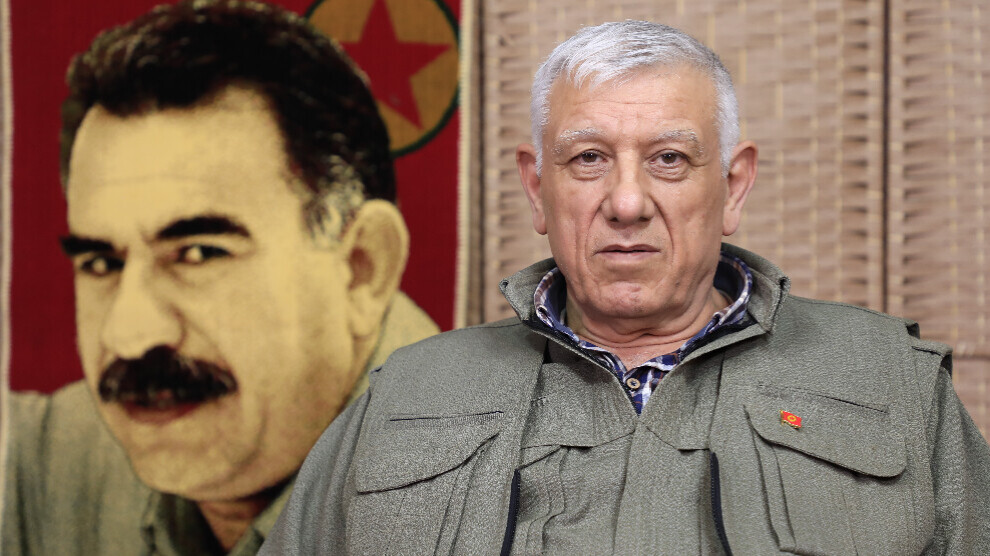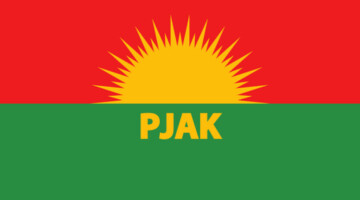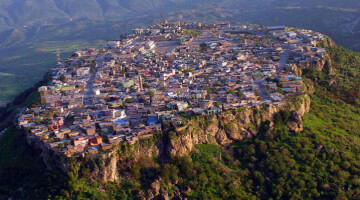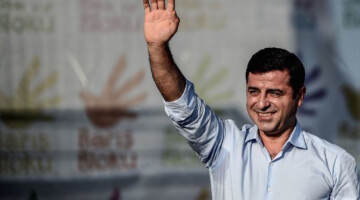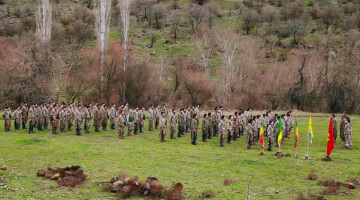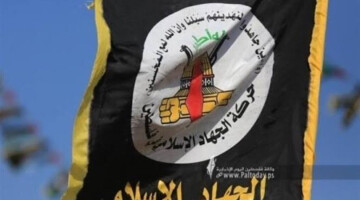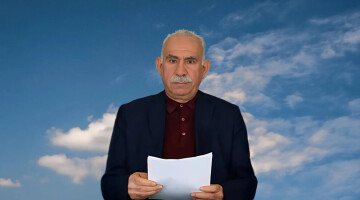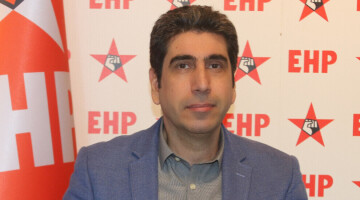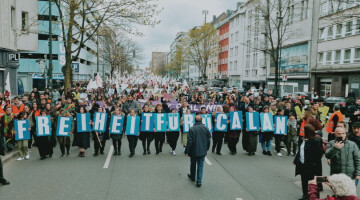Cemil Bayik, the co-chair of the Executive Council of KCK (Kurdistan’s Communities Union), was interviewed by ‘Responsible Statecraft’ on the PKK's policy, the war with Turkey, the Turkish operation in Gare, the US approach towards the PKK, the US and EU Middle East policy and the political situation in Iraq.
We publish below the full text of the interview.
Some circles accuse you of being a burden that paves the way for several issues for Rojava. Some believe that leaders such as Mazloum Abdi and Ilham Ehmed act according to the PKK leaders. What is your relationship with Rojava?
I don’t have any information about the basis of those claims which argue that our Movement is a burden on Rojava’s shoulders. But it is clear that those who make such claims have no information about the contemporary history of Syria and Rojava. The revolution in Rojava has created great effects on all of humanity. A democratic revolution, pioneered by women, has come into existence in Rojava. All the social strata in Rojava, including women, youth, the elderly, etc., have formed their own democratic will. There is no place for the hegemony of nationalistic and sectarian ideologies there. Diverse identities and religious groups live freely in peaceful coexistence. These facts constitute a model, not only for Syria and the Middle East but also for the whole world. The peoples in Rojava rose up against the Baathist regime and liberated their own lands. At the same time, they defeated DAESH by relying on their own libertarian and democratic system. 12 thousand people fell martyr during this struggle, in which the Kurds, Arabs, Syriacs, Turkmens, and Circassians fought shoulder to shoulder against their enemy. The defeat they dealt on DAESH is not solely a military matter. That defeat relies on their Democratic Nation and emancipatory qualities, characteristic of the Rojava revolution. Hadn’t it been for such a theoretical and political approach, the majority of Arabs in Iraq and Syria would have supported DAESH, making it impossible to be defeated. The democratic attitudes and political approaches of the peoples of Rojava are a direct result of the effects of Leader APO’s ideas. He has been living among the peoples of those lands for 20 years and has left great influences on the every aspect of the lives of the Kurds.
How come one can interpret such effects of Leader APO and the PKK on Rojava as a burden!? Leader APO’s influence on the peoples of Rojava has not led to any problems. Quite the contrary, it has ensured the solution of some problems which used to be regarded as insolvable. Had the Rojava revolution not been affected by Leader APO’s ideas, neither would Rojava have achieved freedom nor would have DAESH been defeated. Hadn’t it been for the effects of Leader APO’s ideas, DAESH would have killed all the Yazidis of Sinjar and occupied South Kurdistan territory. Thousands of our guerrilla fighters went to Rojava and fell martyr in the fight against DAESH. They were from all parts of Kurdistan. How is it possible to see them as burdens on Rojava?! Thousands of PKK sympathizers from all walks of life, undeterred by the attacks and obstacles of the Turkish army and police forces, marched over the border fences and joined the anti-DAESH fight in Rojava. How can they be considered as burdens?! Hadn’t it been for the defining role of our guerrilla forces, Raqqa wouldn’t have been freed. While the PKK deserves being appreciated for its defining role in Rojava, it is regarded by some as a burden on Rojava. This is totally incongruous with any sense of justice and equity. Everywhere, we encourage the freedom and democracy struggle of the Kurds. We have a positive effect on this struggle. We have never encouraged negative developments. Quite the contrary, one can see our effects on all positive developments.
Mazlum Abdi and Ilham Ahmed have stayed with the PKK for tens of years. They used to assume managerial roles and responsibilities. This is a fact known by the USA, EU, Turkey and all interested parties in the world. They used to be our PKK comrades from Rojava. At the start of the Syrian crises they demanded to go to Rojava and wage struggle for the protection of their people and the freedom of their own lands, where they had been born. It was their own right to put forward such a demand. So they went there. They joined the revolution and assumed responsibilities in the struggle of the Kurdish people. The Kurdish people had already had a certain level of self-organization there. Mazlum Abdi and Ilham Ahmed had stayed in our ranks for tens of year and it was quite natural that they were influenced by the PKK. It is impossible to be with the PKK and stay unaffected by it. The positive qualities that they possess can be traced back to their stay with the PKK. In this way they have earned their expertise and capabilities. There is no doubt that companionship in ideas and emotions does not come to an end with changes in the place; that is, it does not end when one goes to other areas. But, we should understand that millions of Kurds, Arabs and Syriacs live in Rojava and Northern Syria and have reached a certain level of self-organization. We do not have any organizational link with them. They decide on their own. At the same time, if you argue that they have politically and ideologically been influenced by our Movement I can surely tell you that there are such effects to some extents. The people of Rojava have been influenced by the ideas of Leader APO. Even before the Rojava revolution, thousands of youth from Rojava participated in HPG and YJA-Star ranks. Thousands fell martyr in the struggle against Turkish state. In brief, there are effects in terms of ideas and emotions. And this has its own political implications. Moreover, the place at question is Rojava, not a different country. Rojava is a part of Kurdistan. The PKK has influence over four parts of Kurdistan. As far as Rojava is concerned, our relations are limited to emotional and ideational ones. Politically and administratively, they have their own decision-making mechanisms. We have already voiced criticisms about the way they do politics. It should be seen as our most natural right to criticize and, at the same time, support a Kurdish movement.
You call for decentralization but at the same time the authority in the PKK concentrates in the hands of few aged leaders that control territories far away from themselves. Is this a kind of contradiction?
Our line of politics aims at solving the Kurdish question via self-administration of the Kurds within the political borders of, and at the same time, the democratization of the respective countries in which they live. In fact, all authoritarian and repressive mind-sets impose the state model. But we struggle for the establishment of a social model based on democratic and confederal tenets. How can a political administration which relies on such a social model be authoritarian?
Our notion and system of politics foresees a model in which every region can hold the initiative in its own hands. That is, each confederal unit enjoys its own right to freedom and decision-making. Within this system, the youth and the women have the right to self-organization, autonomous decision-making and duty-sharing. Even armed forces have such a free and autonomous organizational model. It is difficult to manage such a broad movement through centralist decision-making mechanisms. It is also difficult to directly manage the daily administrative affairs of geographically far-off areas. On the contrary, many problems arise when the many regions and organizations take the decision-making initiative into their own hands. We regards these problems as the results of the characteristically empowering qualities of our system and movement. It is possible for democratic and confederal system to experience such sorts of problems. In this sense, arguing that our political system is centralized in the hands of a few elderly people does not reflect the ideological and theoretical reality of our Movement. No authoritarian administration can exist in an organization which is based on women’s emancipation, women’s free self-organization and will-power. Also, it is not right to claim that our administrative body is comprised of elderly people. The majority of our administration body is composed of middle age and young people. In fact, half of our managerial board consists of young and middle-aged women, as a necessity of our organizational charter. The age average of our managerial board shows that we are the youngest political administration in the world.
We would like to reiterate that the PKK is a movement which holds the most number of congresses and conferences in a year. All decisions are taken in sessions with broad-based participation. Those in the managerial board are only putting these decisions into practice.
Your organization is isolated in distant mountains and weapons are nothing but old Russian rifles. At the same time, Turkey is a leading country in production of unmanned aerial vehicles. How will you triumph over the Turkish state militarily? Does your current strategy seek a military escalation or peace?
It is not true that we have been isolated in the mountains. No doubt, we have vast mountainous areas. Kurdistan is, in one way, known as the land of mountains. We have been waging a guerrilla struggle in these mountains for 40 years. This shows the degree to which the guerrilla and the mountains are integrated with each other. But, our land does not consist only of mountains. Compared to all democratic and national movements, our movement enjoys the broadest of social support. We have a great social base in all four parts of Kurdistan. Contrary to some claims, we are not a movement locked in the mountains. Our grassroots base is still standing. The fascist regime in Turkey may have quelled and repressed social and political activism to a certain level, but the Kurds support our Freedom Movement and show their support on every possible occasion. Everyone in Kurdistan acknowledges this reality that our Freedom movement enjoys the most popular support among all the Kurds.
There is no doubt that our military capabilities are not as developed and sophisticated as the military inventory of the Turkish army. Turkey uses all the weaponries of NATO. The USA and some European countries provide Turkey with all kind of support. We procure our arms and ammunition, some of which American, from small-scale informal markets. Despite this, our struggle has, for many times, taken the Turkish state to the verge of collapse. The US and some EU countries rushed to its aid and prevented its collapse. No guerrilla force can be compared to formal armies, in terms of the sophistication and quantity of weapons and ammunitions. In other words, the victories in guerrilla struggles have never been the result of supremacy in arms and ammunitions. In the course of history, legitimacy, rightfulness, and superiority in morale and ideas have been determining factors in the success of guerrilla struggle against the armies of repressive regimes. These same factors underlie our superiority against the Turkish state.
In recent years, the Turkish state procured many sophisticated weaponry and UAVs. They used all the resources at their disposal to buy such weaponry. This large-scale arms procurement followed the many setbacks they had suffered on the hands of our guerrilla struggle. They managed to procure such sophisticated arms and technologies at great costs. There is no doubt that these high-tech arms created some problems for us. But we are developing the type of guerrilla organization and struggle which can render such high-tech weapons null and void. As a matter of fact, this is the defining characteristic of guerrilla struggle. We are developing our own measures and military concepts against UAVs and other sophisticated weapons. In fact, the defeat of the Turkish army in the Gare mountains and its withdrawal from this guerrilla base, after its February 10 full-scale military operation in the area, was the result of such new guerrilla tactics and measure.
We want to transform the Turkish state through the integration of guerrilla struggle, social struggle, actions in the cities, and many other forms of struggle. Through such a multi-dimensional struggle we are determined to defeat the Turkish state’s anti-democratic policies of denial and annihilation against the Kurds. The guerrilla is only one of the dimension of such a multi-dimensional struggle.
As far as the solution of the Kurdish question is concerned, we have put forward the most reasonable proposals for a solution, unprecedented in the history of all similar struggles in the world. These proposals and demands would have been accepted if they had been posed anywhere in the world other than Turkey. The Turkish state does not accept, in any form, any political solution to the Kurdish question. The main aim of this state is to subject the Kurds to genocide. Through policies to Turkify the Kurds, the Turkish state wants to turn Kurdistan into an area for expanding Turkish nationalism. The current impasse does not result from the excessive demands from our part. We have come up with the most reasonable proposals for the solution. In brief, the current deadlock is not the result of raising the level of our political demands. At issue, is the denial of the national identity and the most natural rights of a people. We are not after military solutions, but democratic political solutions. We tried all the ways to achieve this, but the Turkish state did not take one single step forward. What the Turkish state imposes on us is the self-denial of our national identity and abandoning our political rights. They reject anything which can potentially upkeep the national identity and existence of the Kurds.
There is no doubt that we prefer a peaceful and democratic solution. But, as far as the current mind-set of the state and the current AKP-MHP fascist rule continues, no such thing is possible. The path to democratic solution and peace will be opened only when this fascist rule tumbles down.
Have you killed Turkish prisoners of war in Iraq, which you denied earlier? When should the world believe in your story?
One can easily learn about our approach towards POWs by looking at our 40-years-long record in this regard. Our Movement can be criticized for other matters, but can never be criticized for its approach towards the POWs. We have, for many times, set free dozens of POWs. None of them has ever complained about our negative treatments. All had positive reactions with regard to our POW policies. Our approach to POWs is in conformity with UN conventions. Our practice speaks volumes in this regard. What happened in Gare is the 4-days-long continuous bombardment, by more than 40 fighter jets, on a camp in which the POWs were being kept. The geographical structure of the area had been changed by such heavy bombings. As a result, both the POWs and the guerrillas guarding them lost their lives. There is no trace of bullets in the bodies of those guerrillas who used to guard the POWs. This proves that the Turkish state has used chemical gas against the camp. Everybody acknowledges the fact that these POWs were safe till the day when the military operation started. Their death came as a result of heavy bombardments and clashes.
There had been heavy clashes in the camp where the POWs were being held. Failing to break the resistance of the guerrillas, the Turkish army used chemical gas to enable its entry into the camp. As chemical weapons kill indiscriminately, one can easily see who holds responsibility for the death of the POWs. The commanders of the guerrilla forces have already called on all independent circles and forces to visit the camp and carry out due investigations.
The U.S. designate you as a terrorist organization. Do you think the U.S. should delist you as a designated organization? Has your founding purpose changed since the Cold War era?
The United States’ designation of the PKK in the terror list is completely based on political interests. They have made such a decision to appease their NATO-member ally, Turkey. The terror list designation is totally an imposition of Turkey on the US administration. Our guerrilla forces have never made any military action, direct or indirect, against the United States of America. The same procedure holds true for the EU countries’ same designation of the PKK. In this sense, designating the freedom struggle of a people as terror amounts to crimes against humanity. The USA is committing crime against the Kurds. The US is responsible for the captivity and imprisonment of our Leader Abdullah Ocalan. It should refrain from pursuing such policies and practices. The US administration has no legitimate right to make decisions, on behalf of the American people, against the freedom struggle of the Kurdish people. The US has included our name on the rewards list. This is utter injustice and disrespect. The US administration has to make self-criticism in this regard. Otherwise, history will judge them for complicity in the genocide of the Kurds and hence crimes against humanity.
From the 1990s on, our Freedom Movement has undergone great transformations. There is no longer any ideological and political effect of the Cold-War era on our Movement. We went through great changes. But the US is still behaving according to Cold War momentums. It has largely upheld the visions, arguments and policies, characteristic of the Cold-War era.
Our Freedom Movement promotes Democratic Socialism within the conceptual framework of “Democratic Modernity”. We believe that without democracy, socialism can never be achieved and that such concepts as “proletarian dictatorship” are wrong and anti-democratic. We don’t differentiate between democracy and socialism. We no longer uphold the classical understanding that states should be toppled down by force. Our struggle is based on the “state + democracy” formula. We have abandoned the classical revolutionary notions. We upheld societal democracy as we went through many radical changes. From the 1990s on, our Freedom Movement has gone through historically great revolutions in terms of mentality and conscience. We defend radical democracy, rather than controlled democracy. The three main pillars of radical democracy are women’s emancipation, societal democracy and ecology. We are pioneers in promoting these values globally. Our understanding of freedom can be best understood in the words of our Leader, Mr. Abdullah Ocalan, when he says “women’s freedom is more valuable than national and class freedom”. He regards ecological knowledge as the most basic knowledge.
In fact, the US and EU know about the changes we have gone through. But they don’t acknowledge this reality. Probably they have found our notion of democracy too radical to be acknowledged.
U.S. President Biden has recently revoked terrorist designation for the Houthis. Some in Washington advocate for getting in touch with you as there is a battle against terror in question. Do you think the Biden administration will review your designation on the list?
He knows that we have waged the greatest struggle against DAESH. Some of our most dignified and valuable fighters fell martyr in the struggle against DAESH, particularly in Rojava. We have had a determining role in the victory of Rojava in the fight against DAESH. How was Raqqa liberated? It is weird that some people talk about the victory over DAESH in Raqqa but ignore the determining role of thousands of guerrillas who ensured this victory by sacrificing their own lives. This is a totally unacceptable approach and incongruous with ethics, conscience, righteousness, and intimacy. The underlying mind-set behind this approach is ‘you would better die, not live”. The designation of the PKK on the terror list has turned into a burden on the shoulders of US politics. Delisting the PKK ought to be the prime agenda of the new US administration. How come they don’t utter a word about the inhumane approaches of the Turkish state and its big support for DAESH, but have done the greatest injustice, in history, against the PKK, a movement which wages a freedom struggle against the dirty ambitions of the mains supporter of DAESH, the Turkish state. The American people’s sense of justice and conscience will not accept this injustice. Those officials who have included the PKK’s name on the terror list have openly abused the authority the American people have granted to them. When the then-president Mr. Obama came to power, we asked him to rectify this injustice against the PKK. Rectifying this injustice will be a measure of President Biden’s sense of justice, rightfulness, and conscience. The decree against three of the PKK executives was taken by the Trump administration based on his close rapport with Erdogan. If there is going to be a change in Trump-era regional and Turkish politics, this decree, too, has to be revoked.
Have you had any contact with the U.S. in recent years? If so, has this been conducted via mediators in Rojava and Sinjar, or directly?
We used to exchange indirect messages via Rojava and Sinjar (Shengal). We have already sent letters to all US presidents. Through different mediators, some of our units have had a few meetings with US units at the local level. They might have wanted to learn our views. These were not high level meetings. Since we are waging the most rightful struggle in the world, we are confident of our views, our rightfulness, and our policies. Therefore, we can meet with all sides. We have no reservations about meeting different parties. Even though we have been waging a struggle against the Turkish state for about 50 years, we have, for many times, established relations and conducted meetings with it. We trust ourselves. We establish all kind of relations which we think are in the interest of our people’s freedom and democracy struggle. However, we don’t build relations with one party at the expense of the interests of another party. We will never be party to any relations that would repress and encumber our free will. If the United States makes policies in favor of the solution of the Kurdish question and democratization, we will never oppose them. As a matter of fact, we have, several times, called on the United States to play its role in this regard. The reason is that Turkey, a NATO-member and US ally, is the main obstacle in the way of democratization and the solution of the Kurdish question. We reiterate our call that the United States and NATO should not support and abet Turkey’s genocidal policies against the Kurds.
Since the Obama term, much has been spoken that the U.S. would reduce interest in the Middle East in order to draw attention to Europe and East Asia. President Biden received no call from the leaders in the Middle East during his first month. Are you of the opinion that the Middle East is no more a priority for the U.S.? From the point of yours and your party as Kurds, is this development a positive or negative one?
It is said that the focus on the Middle East will decrease as it will increase on Far East. This is mostly an economic view and downplays the role of history and culture. Capitalism gives a lot of significance to consumption. It is a superficial view to say that there are a lot of consumers in the Far Asia. The Middle East a deep-rooted cultural and historical background. It is wrong to evaluate it according to its current situation. On the other hand, the Middle East should not be separated from Europe. The Middle East’s deep-rooted cultural and historical heritage and its geographical proximity to Europe has made great contributions to the progress of the latter. Today, Europe is, in a way, integrated with the Middle East. There is no decline in the strategic importance of neither Europe nor the Middle East. The Middle East and its surroundings continue to be home to the most complex agendas of international politics. DAESH was a common challenge for all. There were interventions in Iraq and Afghanistan. On the other hand, we should not forget that Israel is a part of the Middle East. Looking at the geographical position of the Middle East is enough to understand its importance.
We don’t want to elaborate on the positive and negative dimensions of the changes in the United States’ focal points of interest. We don’t think that there will be a decline in the significance of the Middle East. On the other hand, in an increasingly globalized world, it is impossible to imagine that the significance of the Middle East would decrease. Yet, there are reasons that imply the opposite.
In the Middle East, Kurdistan will preserve its own significance. Even, the Kurdish people’s democratic struggle and its pioneering role, inspired by the notion of Democratic Nation, in ensuring the peaceful co-existence of diverse ethnic and religious entities, has increased the importance of Kurdistan. Given their culture and policies, the Kurds have turned into the basis of peace, stability, and democracy in the Middle East.
We have recently witnessed Europe undertaking a more assertive and independent role against the Middle East. For instance, French President Macron interferes in the Lebanon crisis and the sea water disputes between Greece and Turkey. Would you like to see European initiatives for your cause? How do you define your relationship with Europe in general?
The European countries show interest towards the Middle East. This is understandable. Europe should care about and show interest towards the Middle East. But it has to develop in a positive way. We don’t see much difference between Europe and the Middle East. Therefore, we think that Europe should have relations with the Middle East. We wish that these relations would be based on mutual interests. France and the United Kingdom have historical responsibilities towards the Middle East. It seems that the US has taken over this responsibility from the UK. Or, they may have shared it. As a matter of fact, France has always shown interest towards Lebanon and Syria. Being indifferent in this regard would eventually sever France’s ties with the Middle East. Being cognizant of its effects in Syria and Lebanon, the US has opted to associate its due policies with France.
There is a significant Kurdish population in Europe. This provides the context for establishing relations with European countries. We have positive influence over the democratic public opinion of Europe. Also, we have established relations, to a certain level, with political circles. However, because of their interest-based ties with Turkey and NATO-membership, these relations have had a limited effect on the policies of the European countries. They know our Movement and acknowledge its positive role in the democratization of Turkey and the Middle East. But their relations with Turkey still get them to the point of supporting Turkey, reminiscent of their Cold-War era policies. Therefore, they have come to the point of abetting Turkish genocidal policies against the Kurds.
President Biden has declared his intention to return to the 2015 nuclear deal with Iran and called on Iranians to return to negotiations on nuclear issue. Regardless of the success of these dialogues, do you consider this a development to have influence the Kurds and your movement positively or negatively? What is your opinion regarding the 2015 deal?
We neither approve the making of nuclear weapons nor any investment on it. We think that both have negative effects on the peoples. Had the interested parties adopted an intimate approach towards the 2015 agreement, it could have had positive results. Nothing is more wrong and dangerous than the existence of nuclear weapons in the Middle East. Nuclear weapons should not be seen as a tool for showing off strength. This would be unethical and a crime against humanity, as seen in the Second World War. Nuclear weapons are detrimental not only for the Kurds, but also for all the peoples of Iran. Having ambitions to possess nuclear weapons means having a Cold-War era mindset. The success of the 2015 agreement would have positive results for all the peoples of the Middle East. Given the fact that democratization is the best approach to solve the problems in Iran, the public opinion, both at home and abroad, should not get engaged solely in the nuclear issue. The Islamic Republic of Iran needs to undergo a democratization process. In our view, it is not right to pit Islam and democracy against each other. That’s why Leader APO promoted the notion of Democratic Islam. We regard the democratic Islamic forces as constituents and parts of democratic life.
Al-Kadhimi is defined as a president that will re-ensure the sovereignty of Iraq. Do you think that Al-Kadhimi will confront Turkey and Iran over their interventions in Iraq’s domestic affairs and what does this mean for your party? You are also stationed on Iraqi land and how is your relationship with Baghdad in general?
Prime Minister Al-Kadhimi is not in a position to oppose Iran and Turkey. He doesn’t possess the necessary power to do so. Iraq’s sovereignty can be ensured through the adoption of a certain mind-set, not the appointment of a specific person. Iraq needs to adopt the notion of Democratic Nation. That is, there is a need for an ideological and political approach that can ensure the peaceful co-existence of all the diverse ethnic and religious communities. Neither sectarianism nor nationalism should get the upper hand in Iraq. The democratization of Iraq will make it hard for others to intervene in its internal affairs. We are against any intervention in the internal affairs of Iraq.
Our forces are mostly positioned in the Medya Defence Regions. These are areas on the Turkish border. With the help of KDP as a collaborator, Turkey is attacking these regions. Iraq is not strong enough to stand against such attacks on its soil by Turkey. Our relations with Iraq are not bad. As a matter of fact, our attitudes and the positioning of our forces is not against Iraq. Through putting pressure on Iraq, both Turkey and Iran have, for many times, planned to pit Iraq against us. They have failed, because our presence poses no harm and danger to Iraq. While waging struggle against DAESH, the Iraqi Prime Minister Haydar Al-Abadi thanked the KCK for protecting Iraqi citizens. Iraq was the first country to appreciate our role and the costs we had paid in the struggle against ISIS. The head of KDP, Masoud Barzani, thanked our guerrilla forces for their role in defending Erbil against DAESH. Yet, afterwards, he approved and gave legitimacy to the attacks of Turkey against the guerrilla forces he had thanked.
We don’t have a close relation with Iraq. From time to time, our units in different areas hold meetings with Iraqi officials with the aim of understanding the policies of each other. However, we criticized them for striking the Sinjar deal with the KDP, on October 9, 2020, without conferring with the Yazidis. Iraq and KDP, which had handed over Sinjar to DAESH, reached an agreement over the area, without conferring with and asking for the views of those Yazidi forces who have defended Sinjar against DAESH for six long years. This was totally incongruous with rightfulness, conscience, and political ethics. This agreement failed to be implemented as it had been planned. Even the US which used to call on Iraq, Turkey and KDP to solve the Sinjar issue, began to realize that the exclusion of the will of the Yazidis in this agreement does not help. The US should have now come to a conclusion that the best solution is the one in which the Yazidis, themselves, would play an active role.

